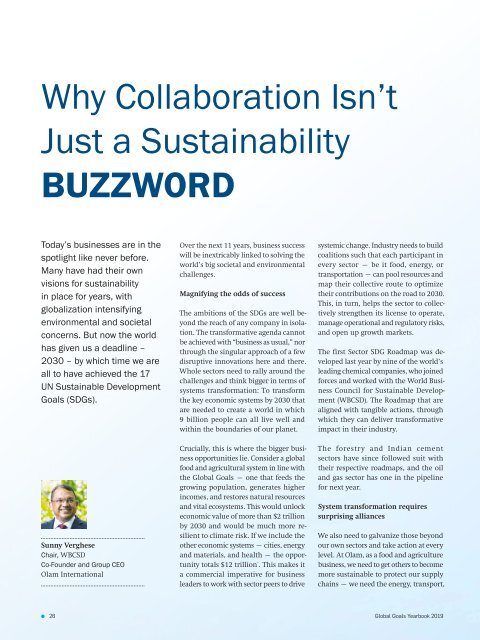Aliging Profit with Purpose - Global Goals Yearbook 2019
What are companies for? The rules for companies have changed. The focus is increasingly on their sustainable, social, and ecological impacts. The strategic orientation toward the so-called corporate purpose is decisive for profitable growth in the future. This currently results in a large number of questions for businesses: How do you find an inspiring and future-oriented corporate purpose, and how can it be aligned in such a way that it brings profitable growth and social responsibility in concert? The new 2019 edition of the Global Goals Yearbook offers answers to these crucial questions thanks to its consistent orientation toward the UN Sustainable Development Goals and a competent editorial board and author pool.
What are companies for? The rules for companies have changed. The focus is increasingly on their sustainable, social, and ecological impacts. The strategic orientation toward the so-called corporate purpose is decisive for profitable growth in the future.
This currently results in a large number of questions for businesses: How do you find an inspiring and future-oriented corporate purpose, and how can it be aligned in such a way that it brings profitable growth and social responsibility in concert? The new 2019 edition of the Global Goals Yearbook offers answers to these crucial questions thanks to its consistent orientation toward the UN Sustainable Development Goals and a competent editorial board and author pool.
You also want an ePaper? Increase the reach of your titles
YUMPU automatically turns print PDFs into web optimized ePapers that Google loves.
Why Collaboration Isn’t<br />
Just a Sustainability<br />
BUZZWORD<br />
Today’s businesses are in the<br />
spotlight like never before.<br />
Many have had their own<br />
visions for sustainability<br />
in place for years, <strong>with</strong><br />
globalization intensifying<br />
environmental and societal<br />
concerns. But now the world<br />
has given us a deadline –<br />
2030 – by which time we are<br />
all to have achieved the 17<br />
UN Sustainable Development<br />
<strong>Goals</strong> (SDGs).<br />
Sunny Verghese<br />
Chair, WBCSD<br />
Co-Founder and Group CEO<br />
Olam International<br />
Over the next 11 years, business success<br />
will be inextricably linked to solving the<br />
world’s big societal and environmental<br />
challenges.<br />
Magnifying the odds of success<br />
The ambitions of the SDGs are well beyond<br />
the reach of any company in isolation.<br />
The transformative agenda cannot<br />
be achieved <strong>with</strong> “business as usual,” nor<br />
through the singular approach of a few<br />
disruptive innovations here and there.<br />
Whole sectors need to rally around the<br />
challenges and think bigger in terms of<br />
systems transformation: To transform<br />
the key economic systems by 2030 that<br />
are needed to create a world in which<br />
9 billion people can all live well and<br />
<strong>with</strong>in the boundaries of our planet.<br />
Crucially, this is where the bigger business<br />
opportunities lie. Consider a global<br />
food and agricultural system in line <strong>with</strong><br />
the <strong>Global</strong> <strong>Goals</strong> – one that feeds the<br />
growing population, generates higher<br />
incomes, and restores natural resources<br />
and vital ecosystems. This would unlock<br />
economic value of more than $2 trillion<br />
by 2030 and would be much more resilient<br />
to climate risk. If we include the<br />
other economic systems – cities, energy<br />
and materials, and health – the opportunity<br />
totals $12 trillion * . This makes it<br />
a commercial imperative for business<br />
leaders to work <strong>with</strong> sector peers to drive<br />
systemic change. Industry needs to build<br />
coalitions such that each participant in<br />
every sector – be it food, energy, or<br />
transportation – can pool resources and<br />
map their collective route to optimize<br />
their contributions on the road to 2030.<br />
This, in turn, helps the sector to collectively<br />
strengthen its license to operate,<br />
manage operational and regulatory risks,<br />
and open up growth markets.<br />
The first Sector SDG Roadmap was developed<br />
last year by nine of the world’s<br />
leading chemical companies, who joined<br />
forces and worked <strong>with</strong> the World Business<br />
Council for Sustainable Development<br />
(WBCSD). The Roadmap that are<br />
aligned <strong>with</strong> tangible actions, through<br />
which they can deliver transformative<br />
impact in their industry.<br />
The forestry and Indian cement<br />
sectors have since followed suit <strong>with</strong><br />
their respective roadmaps, and the oil<br />
and gas sector has one in the pipeline<br />
for next year.<br />
System transformation requires<br />
surprising alliances<br />
We also need to galvanize those beyond<br />
our own sectors and take action at every<br />
level. At Olam, as a food and agriculture<br />
business, we need to get others to become<br />
more sustainable to protect our supply<br />
chains – we need the energy, transport,<br />
26 <strong>Global</strong> <strong>Goals</strong> <strong>Yearbook</strong> <strong>2019</strong>

















